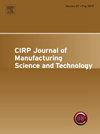Sensors for in-process and on-machine monitoring of machining operations
Abstract
Machining is extensively used for producing functional parts in various industries such as aerospace, automotive, energy, etc. There is a growing demand for improved part quality and performance at lower costs from increasingly difficult-to-machine materials. Whilst modern machine tools are equipped with sensors for closed loop control of their axes’ movements and position, they provide minimal information regarding the cutting performance and tool condition. The integration of additional sensors into cutting tools, machine tools and/or their components can provide an insight into the machining performance. It also provides an opportunity to improve the machining process and reduce the need for post-process inspection and rework. This paper presents a comprehensive analysis of various sensors utilised for in-process and on-machine measurement and monitoring of machining performance parameters such as cutting forces, vibrations, tool wear, surface integrity, etc. Data transfer and communication methods, as well as power supply options for sensor-integrated systems are also investigated. Sensor integrated machining systems can potentially improve machining performance and part quality by early detection of errors and damages, maximising tool usage and preventing machining and tool wear induced damages. A combination of sensor data collection and intelligent sensor signal processing can further increase the capabilities of sensor integrated systems from process monitoring to active process control.

 求助内容:
求助内容: 应助结果提醒方式:
应助结果提醒方式:


